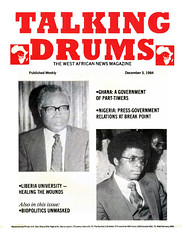Comment
Aid From The Needy
A bemused official at the port told an incredulous and almost indignant reporter that he was as surprised as everybody else when he saw the scenes of devastation and living skeletons on his television, all blamed on the drought, and came to work the next morning to supervise the unloading of fruits and vegetables from Ethiopia.
Somebody added helpfully that ironic though it might seem, it was better to export the fruits and vegetables to Britain because they would never reach the starving in Ethiopia anyway. It was not explained what would happen if the British charities or public donated such fruits and vegetables and flew them into Ethiopia.
But maybe this incident falls into the category of the now infamous whisky being exported from Britain into Ethiopia at the height of the famine. As the Ethiopian Ambassador to Britain explained, life must go on, the big diplomatic community in Addis Ababa must have their whisky and the Ethiopian government gets much needed revenue from the taxes that are levied on items like whisky. The economy must go on, things cannot stop simply because of a famine.
Back in Ghana, two batches of trained graduate teachers have just left for Libya to teach in Libyan schools. An official announcement said that 500 such trained Ghanaian teachers will be leaving to go and teach in Libyan schools.
The situation in the Ghana schools might not have quite reached the scene in the starvation camps in Korem in Ethiopia, but the difference is not very much. The greatest problem that has faced the education authorities in Ghana for the past decade has been the exodus of trained teachers to other countries.
At one time, there was hardly any school in Nigeria, from Primary to University level, that did not have a Ghanaian teacher or two. All kinds of stratagem have been tried to lure the teachers back without much success until the past two years when many have been forced to leave, first as a result of the enforcement of the illegal immigrant act in 1983 and this year as a result of deteriorating economic conditions in Nigeria.
However the situation in Ghana's schools is still critical leading to a severe falling of standards. The West African Examinations Council is now facing problems that hardly existed before of examination leakages and frauds. School children forced to take exams without the benefit of proper tutelage and sometimes without even the presence of untrained teachers, have resorted to desperate methods to "pass" their exams.
The Universities of Ghana face an equally desperate situation, when they were recently re-opened after almost one year of closure, there were many departments that did not have even four lecturers.
The Teaching Hospital in Korle Bu, one time the pride of Ghana and the envy of our neighbours has been brought to its knees with almost all the lecturers having left the country or been forced into private practice to avoid the indignity of having to take instructions from the hospital's Workers Defence Council. Mr P. V. Obeng, argued the case most persuasively for the British government and the Commonwealth to send lecturers to Ghana. The situation, he emphasised was desperate.
Yet, highly qualified Ghanaians are manning the educational and other institutions in every other country in the world apart from their own. It is most probable that if the Commonwealth Secretariat should look into their files of qualified personnel seeking jobs, the greatest number would be Ghanaians, and that is the country that is in the greatest need of qualified personnel.
Flight-Lieutenant Rawlings and his colleagues would rather have only what they consider to be politically acceptable Ghanaians or go and plead with the international community for experts.
As if all that were not bad enough, 500 trained teachers are now being sent to Libya with the blessing of the PNDC.
It is quite understandable that Flt-Lt. Rawlings should still feel a special bond with Col Gaddafi of Libya, after all, the good colonel helped him to seize power and in the early days when nobody else will come near him, Libya was very generous. The PNDC Chairman possibly believes that he owes an eternal debt to Col Gaddafi, but surely sending trained teachers to Libya when Ghana's schools need them so desperately is taking the demands of friendship or a sense of gratitude a bit far?
Or could it be that this is also another case of 'the economy must go on?' Is Ghana giving teachers for something else? What is Ghana bartering trained teachers for?
In the past three years, Ghana-Libyan relations have been spectacular. It has swung from Flt-Lt Rawlings telling Ghanaians that he was trying to model Ghana after Libya as the only country where true democracy existed, through an exchange of troops between the two countries being called off hours before the Libyan troops were due, to Fit-Lt Rawlings making a coded attack on Col Gaddafi in Ivory Coast for selling oil at exorbitant prices to Ghana.
Is Ghana exporting trained teachers to Libya because of the revenue that will accrue or like the children that have been sent to Cuba, are the teachers also going to learn Libyan revolutionary methods to come back to help the revolutionary process in Ghana?
Is it possible that it is cheaper to send trained Ghanaian teachers to Libyan schools than to send them to schools in Ghana where they are desperately needed?
Or is Ghana exporting teachers to gain "much needed foreign exchange" and then hope that international aid will arrive when the world gets to hear about how Ghanaian schools have no teachers?
